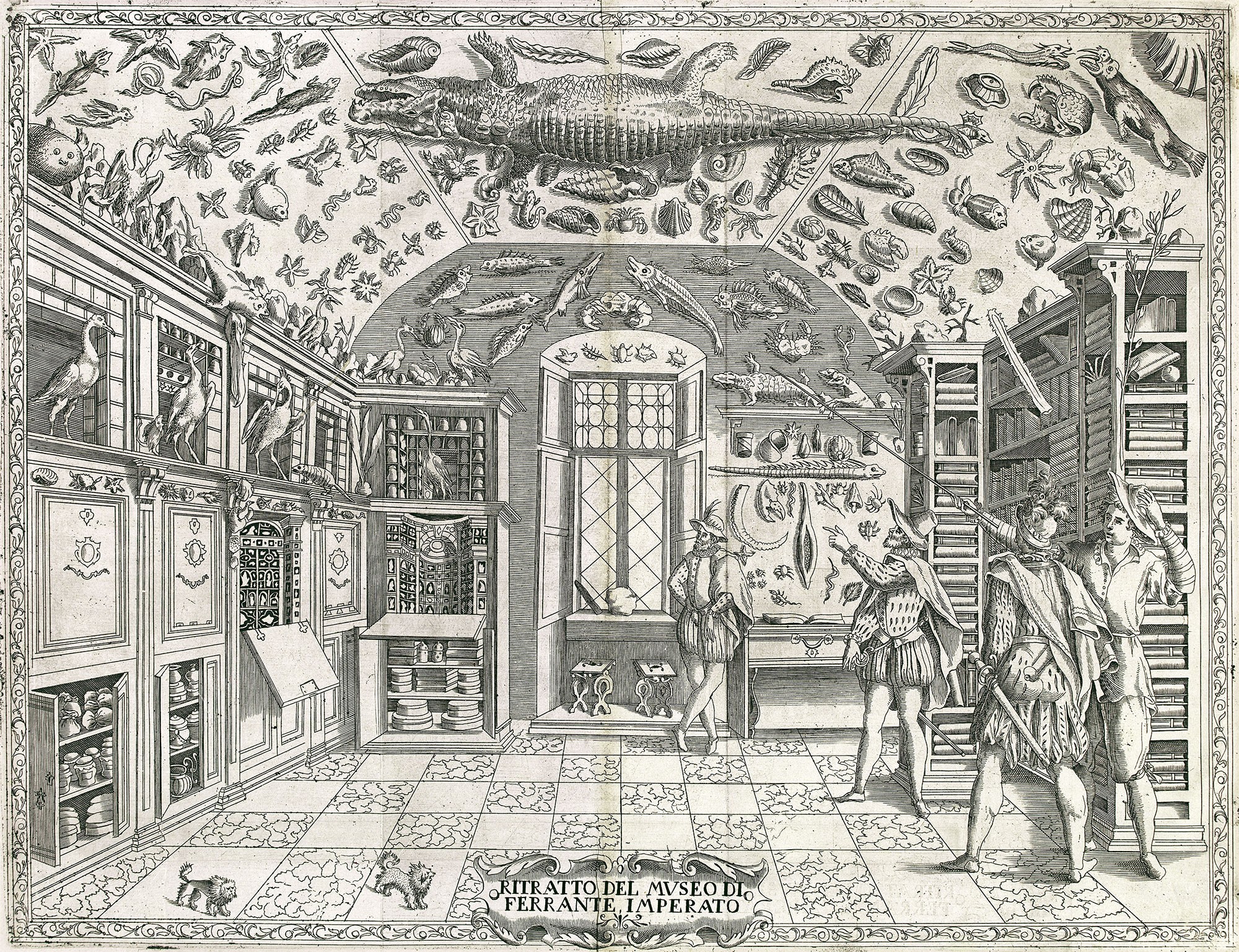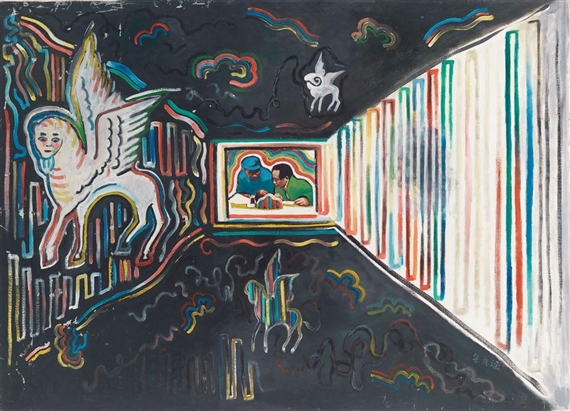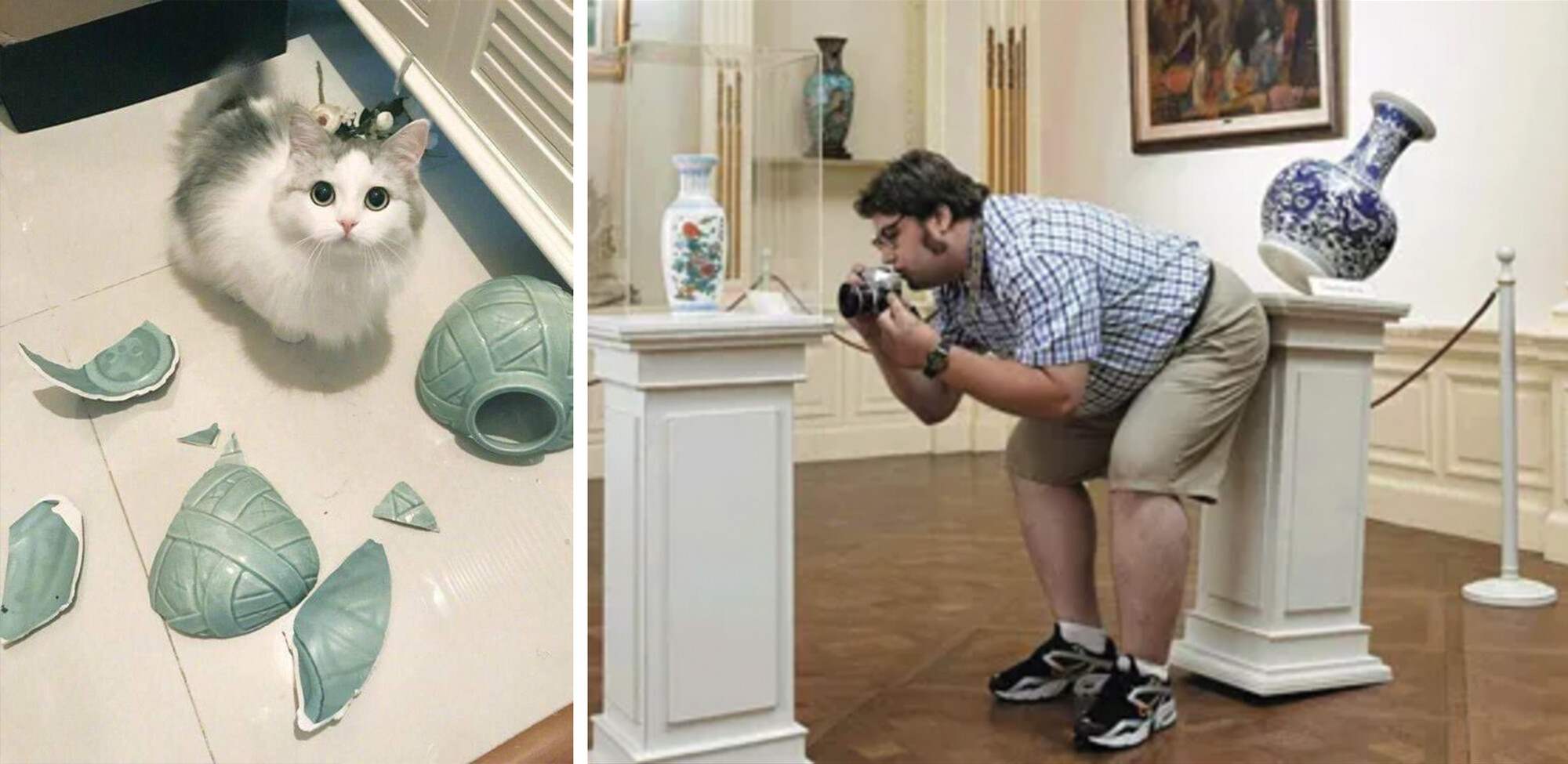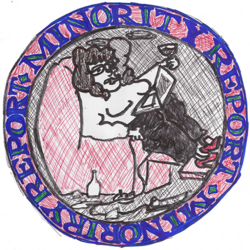In The Analytical Language of John Wilkins, Jorge Luis Borges references a certain Chinese encyclopaedia titled the Celestial Emporium of Benevolent Knowledge. On some remote page within this book it is written that, “animals are divided into (a) those that belong to the Emperor, (b) embalmed ones, (c) those that are trained, (d) suckling pigs, (e) mermaids, (f) fabulous ones, (g) stray dogs, (h) those that are included in this classification, (i) those that tremble as if they were mad, (j) innumerable ones, (k) those drawn with a very fine camel’s hair brush, (I) others, (m) those that have just broken a flower vase, (n) those that resemble flies from a distance.”1 Borges intended this poetic project to reflect the absurdities of taxonomies and modes of classification: to emphasise that there is no classification of the universe, of the wild profusion of existing things, that is not arbitrary and conjectural. The faux erudition of our endeavours manifest in the categories that we make.
After interminable attempts at reduction from Plato to Hegel and the insane hoarding of concepts, the world continues to exist in excess of us. The Celestial Emporium of Benevolent Knowledge and its novel cognitive categories function to reveal the ambiguities, redundancies and deficiencies in our own encyclopaedic paradigms. In reading the above passage from Borges, Michel Foucault apparently burst into laughter. He reasoned his reaction was born of wonder, for “the thing we apprehend in one great leap, the thing that, by means of the fable, is demonstrated as the exotic charm of another system of thought, is the limitation of our own, the stark impossibility of thinking that”.2 The that seems chaotic, we laugh at its alterity but do not take it seriously as a manner of structuring knowledge. The walls of western thought mimic the walls of a museum—or the interior panels of a Wunderkammer. A confined space and state of erudition, these are sites that collect, organise and resolve knowledge into definitive categories and discursive trajectories.
The German term Kunst- und Wunderkammern translates directly to “Cabinet of Art and Marvels”, although it is more popularly referred to interpretively as “Cabinet of Curiosities”. Cabinets of Curiosities proliferated amid the humanist revival of the late-Renaissance. The humanist movement was an archaeological enterprise, “in the sense that it reified scholarship by translating vague antiquarian and philosophical concerns into specific projects, whose existence was predicated upon the possession of objects.”3 These novel cognitive circumstances reinforced a private image of collecting that motivated the cultivation of self within encyclopaedic paradigms that not only organised knowledge but defined the space in which learned activities could occur. It was the beginning of many ideas that lie at the foundations of western thought, the profound interpretation of life via the systemisation and articulation of objects, the flowering of empiricism in all its restrictive glory.

Interestingly, the pursuit of epistemological and ontological gain didn’t figure highly on the agenda of Chinese thinkers. I imagine this is why a Chinese encyclopaedist could write Celestial Emporium of Benevolent Knowledge. Or at least, it is why Borges accredited this fable to a fictive Chinese author. I wonder what this Chinese encylopaedist’s emporium would look like? I doubt it would resemble our cabinets.

If you play the game, this Chinese encyclopaedist has created categories that produce a measure of infinity—categories that conceal rather than reveal the animal as a shifting contingent configuration of circumstances that proliferate at each inductive turn. If an animal here and now is the continuous progress of its past, it can become the united aggregate of all of these categories—indivisible as one kind of animal, a fabulous stray mermaid that belongs to the emperor. If life is lived as a series of successive moments, the animal will oscillate between significations. It is born anew with a clumsy swoosh of its tail and a broken vase, or as the unsuspecting muse of an artist - camel hair brush poised atop a canvas. Either way, the animal is elusive in itself and thus elusive of the Wunderkammer of western thought.
By contrast, the Wunderkammer aspired to hold the entire history and world of humankind, strapped to ceiling rafters, pressed behind glass, teeming in abundance from innumerable drawers, soughing between pages and teetering atop shelves —- crocodiles, wax effigies, death masks, creatures of myth, naturalia, jewels, the cosmos, automatons, the old gods and the new. Its collector shrunk the world to fit a categorical schema through which it could be analysed and rationalised. These cabinets of curiosities were forums of scholarship and accumulation. Definition and classification were the primary aims. Although the organisation of these cabinets varied, organisation was key. Some collectors would allow the repetitions to repeat themselves, putting together (ergo pulling apart) categories of objects according to qualities shared. Meanwhile, other collectors would hasten the progressive fragmentation of their objects, accentuating differences by positioning incongruous things together. The cabinets displayed and the ideas conveyed by their owners outlined a regime of acquisition and interpretation. Knowledge could be possessed; it was tangible and it produced targets.
Borges intended the Celestial Emporium of Benevolent Knowledge to be in jest of such categories. He fictioned an incursion, a composition of affects and mise en scene, without recourse to classical schemas of distinction that isolate the Same animal from the Other. There are no classes or species, no means to consolidate the characteristics of a creature into a denomination of things nor a Linnaean structure to model the dominance of one beast relative to another. The embalmed ones could be at the top of the food chain for all we know and the fabulous ones may have a predilection for soft mosses and neap tides. It isn’t the animal itself but a measure of vantage points, impulses and heuristics, both prior and present, that class it ipso facto as a kind-of-thing. The question of what kind of animal stands before you is relative to the ontological and epistemological justifications you make of yourself, the animal and the world in that moment. The animal as a divisible thing-in-itself destined for a shelf in your cabinet is not a thing. You can’t catch it to stuff it and name it. You make the animal, the animal is you.
~∞∞∞∞∞∞∞∞∞∞~~~~~
Master Zhuang dreamt that he was a butterfly, fluttering hither and thither. He was conscious only of his happiness as a butterfly and he chased the flowers, peony and lotus. He rode the breeze, flitting upwards in listless figure-of-eights toward the blue. ∞∞∞∞∞∞∞∞∞∞. ∞: a symbol chosen in reverence of his infinite form, two-wings-twined? Or, an infinite signifier chartered by the wind itself, looping in jest.
Soon Master Zhuang awoke and there he was, blinking at the sun.
“Now I do not know whether I was then a man dreaming I was a butterfly, or whether I am now a butterfly, dreaming I am a man. However there must be some distinction between a man and a butterfly. This distinction is called the transformation of things.”4
~∞∞∞∞∞∞∞∞∞∞~~~
The Chinese didn’t pay much attention to the question of form because the question of being is not central to Chinese thought. In mandarin 本 (ben) means “original”, “root”, “stem” or “ground”, while 体 (ti) means “body” or “foundation” and 论 (lun) infers a view or an opinion. Benti lun is a theory of the relation between ground and appearance but its rendering in English as “ontology” obscures the significance of this relationship. 本体 (benti) also translates to noumenon.5
Master Zhuang is aware that there is a distinction between man and butterfly but this distinction is so relative it might as well be another division in the Celestial Emporium of Benevolent Knowledge—
“(o) those that dream to be butterflies, (p) those that dream to be men”
The difference between Master Zhuang and the butterfly is in the transformation accrued when waking, when no distinction became the awareness of that lack of distinction. Now, with this awareness, what do you do? Do you pursue the articulation of a difference? Extricate yourself from such dreams? Or do you…
~~ “forget the years, forget distinction. Leap into the boundless and make it your home!” — Master Zhuang. ~~

The fabled title—Celestial Emporium of Benevolent Knowledge—can be abstracted to explain its own nebulous lack of distinctions between things. The word 商场 (shāngchǎng, emporium) infers a site of commerce or exchange, a spot where individuals come to select and exchange goods. It is the market world. Meanwhile, “benevolence” in mandarin, 仁 (rén), is a term applied in Confucianism to describe a kind-of intuitive or innate knowledge, also referred to as 良知 (liángzhī). In the west, this idea of benevolent knowledge is best understood in Kantian terms as direct knowledge of things-in-themselves, or the intuition of the noumenon. Kant supposed intellectual intuition to be where God was. Likewise, the prefix 天 (tiān, celestial) or 天上 (tiānshàng), reiterates a transcendent sphere of noumenal apprehension. However, the Confucian “heaven” is not a place or creationist force as in Judeo-Christian lore. It is more of an impersonal cosmic force that enriches and continues all that exists. Additionally, the inverse of heaven is not hell. There is only a kind of heaven and earth resonance or 天地 (tiāndì, heaven and earth). So, to have a bit of fun here, this is an emporium of the heavens trading in intellectual intuition.
It’s not that the west’s cabinets of curiosities were only confined to the tangible. These spaces were mental structures and collecting was foremost a cognitive activity. This was how western religious conviction influenced the shape and function of these collections. The Jesuits in particular pursued the humanist desire for prisca scientia to enframe God and extend the Christianising mission of the post-Tridentine church; shaping the world in God’s image. Hoarding His objects as evidence of a metaphysical truth, so to speak. Then came Kant who produced a philosophy of limits and deconstructed the world into the phenomenal and noumenal. The phenomena concerns appearances—that is, objects of possible experience—and Kant isolated the human mind here. He believed it impossible to know things independent of our phenomenal experience of them. That which exists independent of the senses, the thing-in-itself, is of the noumenon (benti). Kant elevated and plonked God there.
In 1975, New Confucian philosopher Mou Zongsan performed a reverse dive pike, a stunning display of metaphysical acrobatics, when he claimed Chinese thought to have always given priority to the noumenon over the phenomenon. As Yuk Hui clarifies, “Chinese philosophy tends to advance the activities of intellectual intuition, but refrains from dealing with the phenomenal world: it pays attention to the latter only in order to take it as a stepping stone to reach ‘above form’.”6 It is important to note that “metaphysics” in Mandarin translates to “that which is above forms” (形而上, xíngershàng) and is a synonym of 道 (dào, Dao) in the Yijing (I Ching, the Book of Changes). Kant restricted the mind to the level of phenomena, to the world of appearances. He believed the noumenon inaccessible and yet Mou stakes it as the very core of Chinese thought. According to Mou (the MOUmenon), what brings about the phenomenal world (the world of sense) in the first place is the “grasping nature of the cognitive mind” (執性, zhixing). When this grasping nature is absent, the phenomena ceases to exist and the mind reverts to noumena, to benti, and to celestial emporiums. In the west however, Mou argues that the can’t-stop-won’t-stop grasping nature of our cognitive minds is why we hit this Kantian phenomenological reflexivity where “questions about what sort of things there must be” become “questions about the conditions under which it is possible for us to make claims to knowledge about things.”7
There are animals that break vases, but how am I to know if an animal is one to have just broken a flower vase? I would have had to witness the incident to categorise it so. But what of all of the vases that I do not bear witness to being broken by animals? I could categorise the animal insufficiently? Heaven forbid I assume it to be a trained animal and invite it into my home, my beautiful home full of vases?!

The idea of the noumenon baits us, but the birth of modern science imbricates the renunciation of intuition. As Hans Blumenberg has observed:
“The renunciation of intuition is a precondition of modern science; the loss of intuition is a necessary consequence of any theory that systematises itself, that is, that consolidates and arranges its results in such a way that, by virtue of their heterogeneous order, they place themselves in the way of access to the original phenomena and finally take the place of these.”8
We are lured by the animal, grasping for it, we want to see it naked but it bursts into laughter as we approach. The embalmed suckling pigs that tremble as if they were mad find humour in the despair of our reason. The most that we can hope for as we curate our cabinets is this moment of phenomenological reflexivity—I see an animal—become psychological estrangement—what is the animal-in-itself—turn abjection—I must save myself—return nihilist and carry on.
~~~~~
Master Zhuang was fishing in the Pu River. The King of Chu dispatched two high-ranking officials to go before him with this message: “I wish to trouble you with the administration of my realm.” Without turning around, Master Zhuang held on to his fishing rod and said:
“I have heard that in Chu there is a sacred tortoise that has already been dead for three thousand years. The king stores it in his ancestral temple inside a hamper wrapped with cloth. Do you think this tortoise would rather be dead and have its bones preserved as objects of veneration, or be alive and dragging its tail through the mud?”
“It would rather be alive and dragging its tail through the mud”, replied the two officials.
“Begone!” said Master Zhuang. “I’d rather be dragging my tail through the mud.”
-
Jorges Luis Borges, The Analytical Language of John Wilkins (Sur: Buenos Aires, 1952). ↩
-
Michel Foucault, The Order of Things: An Archaeology of Human Sciences (NewYork: Pantheon, 1970), xvi. ↩
-
Paula Findlen, “The Museum: It’s Classical Etymology and Renaissance Genealogy,” Journal of the History of Collections 1, no. 1 (1989): 61, http://jhc.oxfordjournals.org/. ↩
-
Roel Sterckx, Chinese Thought - From Confucius to Cook Ding (Penguin Random House: UK, 2019), 80. ↩
-
Yuk Hui, Art and Cosmotechnics (Minnesota: University of Minnesota Press, 2021), 163. ↩
-
Ibid., 36. ↩
-
Paul Guyer and Allen Wood, “Introduction,” in Kant, Critique of Pure Reason, 25. ↩
-
Hui, Art and Cosmotechnics, 205. ↩
